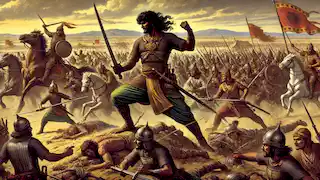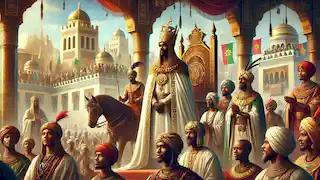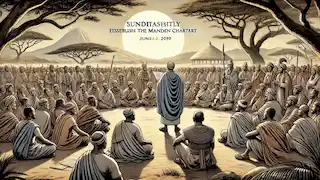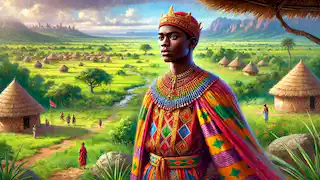Long ago, in the ancient kingdom of Mali, a prophecy foretold that a great king would arise to unite the fragmented tribes and lead them to greatness. This is the story of Sundiata Keita, the legendary hero who founded the Mali Empire. His tale begins with a humble birth and traverses through trials, tribulations, and ultimate triumph. It is a story of courage, perseverance, and the undying spirit of a man destined to become a king.
Sundiata was born to King Maghan Kon Fatta and Queen Sogolon Kedjou in the city of Niani. From the moment of his birth, it was clear that Sundiata was no ordinary child. The royal griots, keepers of the oral traditions, foretold that he would become a great ruler. However, his early years were marked by difficulty. Sundiata was born with a disability; he could not walk. This condition made him the subject of ridicule and doubt among the people and even within his family.
Despite his physical limitations, Sundiata possessed an indomitable spirit. His mother, Sogolon, nurtured him with love and wisdom, often reminding him of his destiny. She told him stories of his ancestors and the great deeds they had accomplished. Inspired by these tales, Sundiata developed a fierce determination to overcome his challenges and fulfill his destiny.
The political landscape of Mali was unstable during Sundiata's childhood. King Maghan Kon Fatta's death left a power vacuum that led to internal strife. Sumanguru Kante, a sorcerer king from the neighboring kingdom of Sosso, took advantage of the situation and invaded Mali. He imposed a tyrannical rule, bringing suffering to the people and causing many to flee in fear.
One day, driven by the desire to help his people and reclaim his father's kingdom, Sundiata resolved to walk. With the support of his mother and a trusted blacksmith named Farakourou, Sundiata fashioned a pair of iron rods to aid him in standing. He struggled and fell many times, but his determination never wavered. Finally, one fateful day, Sundiata stood on his own two feet and took his first steps. The people, witnessing this miraculous event, were filled with awe and newfound hope.
As Sundiata grew stronger, he began to gather a loyal following. His charisma, wisdom, and courage inspired warriors from various tribes to join his cause. He forged alliances and built an army, preparing to challenge Sumanguru Kante and free Mali from his oppressive rule. Sundiata's leadership was marked by strategic brilliance and an unwavering commitment to justice.

The decisive moment came in the Battle of Kirina. Sundiata, now a formidable warrior, led his forces against Sumanguru's army. The battle was fierce and brutal, but Sundiata's tactical genius and the bravery of his men turned the tide in their favor. During the battle, Sundiata confronted Sumanguru, and using his knowledge of the sorcerer's weakness, he defeated him. With Sumanguru's fall, the Sosso forces were routed, and Mali was liberated.
After the victory, Sundiata was proclaimed Mansa, or king, of Mali. He embarked on a mission to unite the diverse tribes and establish a prosperous empire. Sundiata's reign was characterized by significant achievements in governance, trade, and culture. He implemented a code of laws known as the "Manden Charter," which promoted justice, human rights, and social harmony.
Under Sundiata's leadership, Mali became a center of commerce and learning. The empire's wealth grew through trade in gold, salt, and other valuable commodities. Sundiata's capital, Niani, flourished as a hub of economic and cultural exchange. Scholars, artists, and merchants from distant lands were drawn to Mali, contributing to its vibrant and cosmopolitan atmosphere.
Sundiata's military campaigns extended Mali's borders, bringing more territories under his control. He was known for his ability to lead his troops with both tactical acumen and personal bravery. His reputation as a warrior king spread far and wide, and many sought his protection and alliance.
Despite his prowess on the battlefield, Sundiata was also a man of deep compassion and wisdom. He recognized the importance of unity and inclusiveness in building a strong and stable empire. He encouraged intermarriage among different tribes and promoted the use of a common language, which fostered a sense of shared identity among his people.

One of Sundiata's most significant contributions was the establishment of an administrative system that ensured efficient governance. He appointed trustworthy and capable individuals to key positions, creating a network of loyal and skilled administrators. This system allowed for effective management of the vast empire and ensured that the laws and policies he implemented were upheld.
Sundiata also placed great emphasis on education and learning. He supported the establishment of schools and learning centers where scholars could teach and share their wisdom. The spread of Islam in the region further enriched the intellectual and cultural landscape of Mali. Islamic scholars brought new ideas, scientific advancements, and literary works that contributed to the empire's prosperity.
Throughout his reign, Sundiata remained deeply connected to his people. He traveled extensively within his empire, listening to the concerns of his subjects and addressing their needs. His compassionate and approachable nature endeared him to the people, who saw him not just as a ruler but as a protector and guide.
Sundiata's leadership was also marked by his commitment to justice. He was known for his fairness and impartiality, and his court became a place where grievances could be heard and resolved. This commitment to justice earned him the respect and admiration of his people and reinforced the stability of his rule.
As Sundiata grew older, he focused on securing the borders of his empire and forging diplomatic relationships with neighboring states. He understood the importance of peace and cooperation in maintaining Mali's stability. Through strategic marriages, alliances, and treaties, Sundiata ensured that Mali remained a dominant and respected power in the region.

Sundiata's death marked the end of an era, but his legacy endured. His descendants continued to rule Mali, building upon the foundations he had laid. The epic of Sundiata was preserved through oral tradition, passed down from generation to generation by griots. These storytellers kept the memory of Sundiata alive, ensuring that his deeds and values would never be forgotten.
The story of Sundiata Keita is a powerful reminder of the potential for greatness that lies within each of us. It is a story of overcoming obstacles, achieving the impossible, and leading with integrity and compassion. Sundiata's life and legacy continue to inspire people around the world, demonstrating that even in the face of overwhelming challenges, we can rise to greatness and make a lasting impact on the world.
As we reflect on the epic of Sundiata, we are reminded that history is not just a record of the past but a source of wisdom and inspiration for the present and future. The values of courage, unity, justice, and compassion embodied by Sundiata Keita are timeless principles that can guide us in our own lives and endeavors. Through his story, we learn that true leadership is about empowering others, fostering unity, and striving for the greater good. The legacy of Sundiata Keita, the Lion King of Mali, will forever resonate as a beacon of hope and a testament to the enduring power of the human spirit.
One of the most enduring symbols of Sundiata's legacy is the Manden Charter. This code of laws, also known as the Kouroukan Fouga, was established during a grand assembly of chiefs and leaders. The charter laid down principles of governance, human rights, and social justice that were ahead of their time. It emphasized the importance of respecting the rights of individuals, protecting the vulnerable, and ensuring the fair distribution of resources.

The Manden Charter also highlighted the importance of environmental stewardship. It called for the protection of the land and its resources, recognizing the interconnectedness of people and their environment. This forward-thinking approach to governance and sustainability is a testament to Sundiata's visionary leadership.
The epic of Sundiata is not just a story of a single hero but a narrative of a people united by a common purpose. It illustrates the power of collective effort and the strength that comes from diversity and inclusiveness. Sundiata's ability to bring together different tribes and forge a cohesive and prosperous empire is a lesson in leadership and collaboration that remains relevant today.
As we delve into the rich tapestry of Sundiata's life, we see a man who was not just a warrior and a king but a visionary leader, a compassionate ruler, and a wise statesman. His story is a celebration of human potential and the enduring impact of one individual's determination to make a difference.

In the grand saga of Sundiata Keita, we find inspiration and guidance for our own journeys. His legacy reminds us that greatness is not measured by physical strength or material wealth but by the strength of character, the depth of compassion, and the commitment to justice and unity. The epic of Sundiata continues to resonate across generations, a timeless testament to the enduring power of the human spirit and the boundless potential within us all.



















